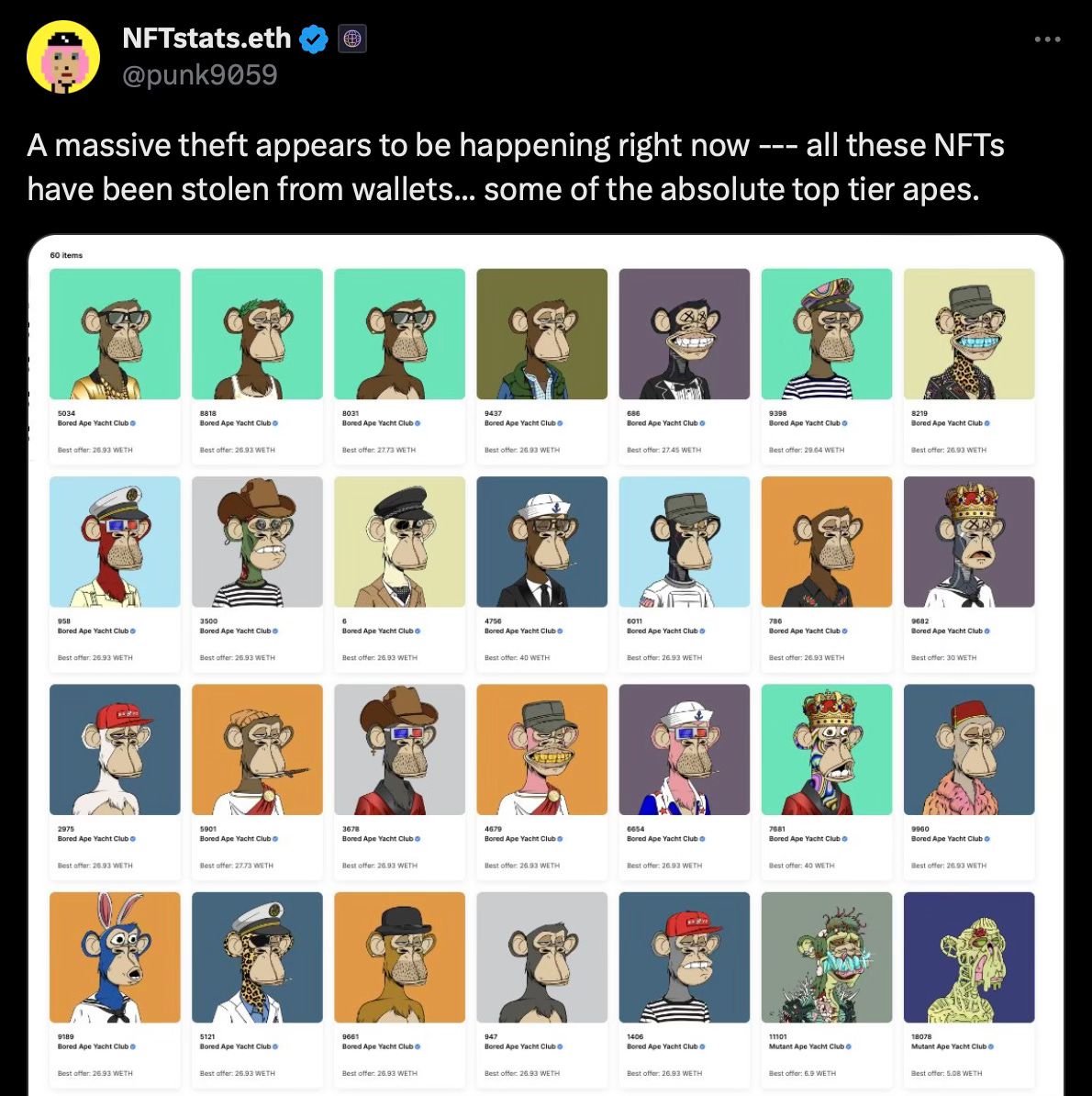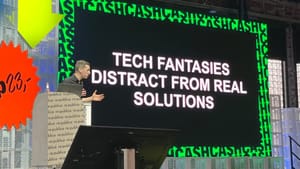
What a year it’s been in tech! The AI hype was in its aggressive expansion phase (we’ll see how that continues into next year), the crypto boom seemed to get some finality with the guilty verdict for Sam Bankman-Fried, and the tech billionaires generally seemed to go even further down the path of right-wing radicalization.
I don’t know if I’d say I’m eager to see what next year has in store, because with this industry and its leaders that usually means more hardship for a lot of people, but I’ll be here to write about and opine on it nonetheless.
Thanks for all your support this year. Disconnect started in February and has grown to almost 9,500 subscribers, over 400 of which pay to support the work that goes into making it every single week. As the year winds down, I decided to make this roundup open to everyone and to simply say that if you enjoy this newsletter, consider becoming a paid subscriber so I can keep making it!
After this roundup, there won’t be a new one until the new year because I need a little break. I do still have a few more posts that will go live between now and the end of the year though, so stay tuned for those! In this issue, I wanted to tell you about an exhibition I visited recently and an important lesson I think it holds for those of us interested in technology, but concerned about the ends toward which it’s currently used.
Over on Tech Won’t Save Us, I spoke to Émile Torres about effective accelerationism and the ideological evolution of Silicon Valley. also shared an update on the open letter to Substack leadership I shared with you a few days ago.
Thanks again for your support this year, and best wishes for the holidays!
— Paris
Project Cybersyn
In 1970, socialist Salvador Allende was elected president of Chile, setting the stage for a unique technological experiment. Allende’s government nationalized key parts of the economy, but needed a way to organize the expanded private sector. In 1971, Fernando Flores, a high-level employee of the Chilean Production Development Corporation, reached out to British management cybernetics expert Stafford Beer to help them build a computer network that would allow them to receive data from public enterprises to plan the economy, while theoretically still leaving autonomy in the hands of workers (not wanting to replicate the problems they perceived in the Soviet system).
Facing pressure both internal and external, the team was under pressure to deliver quickly. By 1972, a prototype was ready that helped defeat a US-backed strike of 40,000 right-wing truck drivers seeking to stall the economy. Between the information from the prototype and 200 trucks, they were able to get supplies around the blockades. But less than a year later the government’s time ran out. On September 11, 1973, a CIA-backed coup overthrew the Allende government, placing Chile under a military dictatorship led by Augusto Pinochet, and Project Cybersyn was dismantled.
To commemorate the 50th anniversary of the coup this year, the La Moneda Cultural Centre in Santiago put together an exhibition about Project Cybersyn and rebuilt the operations room that was destroyed a half century ago. Earlier this week, I had to opportunity to visit it and sit in the ops room, as though I was back in that moment overseeing the Chilean economy.

If you want to know more about Project Cybersyn, I interviewed Cybernetic Revolutionaires author Eden Medina about it on Tech Won’t Save Us back in 2021. She was actually one of the central people involved in putting the exhibition together in Santiago.
It’s a history that shows us the political nature of technology very clearly, something that the tech industry tries to remove from our conversations about their (intensely capitalist) tech products, and how there’s so much technological history that we rarely get told about but which can point to very different potential presents and futures.
Recommended reads
The EU Council and European Parliament reached a provisional agreement over its Platform Work Directive to regulate platform work and give more power to workers. The Gig Economy Project breaks it down and says the key points are new rules on algorithmic management and a presumption of employment if two out of five indicators are met.
The indicators are: 1) effectively determining, or setting upper limits for the level of remuneration; 2) requiring the person performing platform work to respect specific binding rules with regard to appearance, conduct towards the recipient of the service or performance of the work; 3) supervising the performance of work or verifying the quality of the results of the work including by electronic means; 4) effectively restricting the freedom, including through sanctions, to organise one’s work, in particular the discretion to choose one’s working hours or periods of absence, to accept or to refuse tasks or to use subcontractors or substitutes; 5) effectively restricting the possibility to build a client base or to perform work for any third party.
Rest of World put together ten examples of gig worker slang from around the world. I like Brazil’s bololô: “a rallying cry and a call to protest.”
As UK regulators start looking into the OpenAI-Microsoft partnership, the Financial Times provides more detail on the unusual deal after some recent changes on OpenAI’s website. Despite its $13 billion investment, Microsoft holds no equity, but does have a stake in potential capped profits.
Google was found to have an illegal app store monopoly this week, while Apple was found not to in 2021. Why the difference? The Verge’s Sean Hollister breaks it down.
Labor updates
- As Tesla continues to refuse to bargain with its service workers in Sweden, the Transport Workers’ Union says it will no longer pick up the company’s trash.
- Unionized ZeniMax Studios workers negotiated six principles for the use of AI with Microsoft.
- Spotify fired 2,300 people this year as it makes a play for profitability.
- Activision Blizzard (now under Microsoft) will pay $54 million as part of a settlement with California’s Civil Rights Department over sexual harassment and gender-based discrimination.
In other news
Tesla is recalling nearly all of the two million vehicles it’s sold in the United States over regulators’ safety concerns with Autopilot. It has to issue a software update to put more guardrails on the system’s use.
A few days before the notice, the Washington Post reported on how misuse of Autopilot has resulted in deadly crashes.
As major advertisers pull back from Twitter/X, US Democrats are spending millions on the platform.
Marc Benioff is selling about $3 million in Salesforce stock every single day.
Meta had to apologize to Qatari billionaire Wissam al Mana after his image was used in Facebook advertisements pushing crypto scams.
Airbnb will pay a €576 million tax bill in Italy for failing to abide by a 2017 law.
The Canadian government has given more details on how the $100 million Google will be providing to local news organizations will be distributed.
Apple’s market cap is almost as large as France’s entire stock market.
Temu has filed a new lawsuit against Shein as the battle between the companies intensifies.
SpaceX could be facing more regulatory trouble in Texas as a coalition of groups including the American Bird Conservancy and a Native American tribe sue the Federal Aviation Administration for not going through the proper procedures to license Starship launches.
Apple looks to be facing a significant fine in the EU over its previous restrictions on letting Spotify and other music streaming apps let customers know they could subscribe at a lower price without going through the App Store.
A jury decided Google has an illegal app store monopoly in a lawsuit launched by Epic Games.
One more thing
A massive heist is apparently underway in Bored Ape world affecting the “absolute top tier apes,” and yes, I was as surprised as you that anyone still cares about these ugly monkey graphics.

It brought me back to an earlier moment of “all my apes gone,” almost two years ago. May the NFTs finally die someday soon.











Member discussion